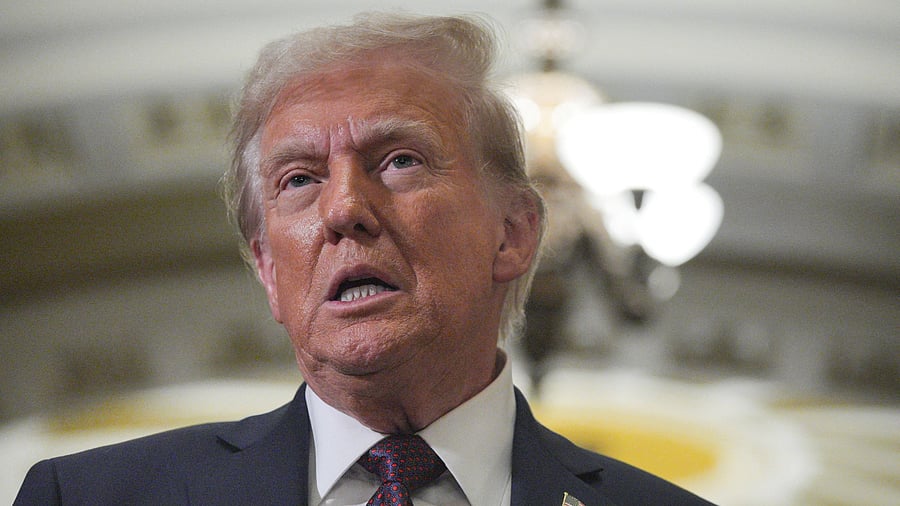
Donald Trump
Credit: Reuters Photo
On 8 January, John Fetterman, a Democratic United States Senator from Pennsylvania, who has sought to portray himself as a political independent in the Senate, raised eyebrows when he likened President-elect Trump’s stated goal of purchasing Greenland from Denmark to the Louisiana Purchase from France in 1803. This territorial acquisition cost the United States government $15 million. The investment virtually doubled the size of the country at the time, effectively adding the modern states of Arkansas, Colorado, Iowa, Kansas, Louisiana, Minnesota, Missouri, Montana, Nebraska, North Dakota, South Dakota and Wyoming. He could have also invoked another similar territorial acquisition: the purchase of Alaska from Russia in 1867 at a cost of $7.2 million, spearheaded by William Seward, the Secretary of State.
Ironically, at the time, Seward was excoriated in the popular press and the purchase of the territory was widely referred to as “Seward’s Folly.”
Both these territories were acquired without any demands or threats from the United States government. Instead, both France and Russia willingly parted with these lands for the funds that were offered to them. Today, as during his first term as president, Donald Trump is again raising the possibility of not only acquiring Greenland but possibly also the Panama Canal and even Canada. The last may well be a jocular proposition, but he does appear quite sincere about purchasing the first two. More significantly, he has not ruled out the prospect of using a degree of coercion, if necessary, to bring those entities into the US territorial fold.
The Canadians, the Danes (who have formal political control of Greenland), and the Panamanians have made it abundantly clear that they do not wish to be incorporated into the United States, regardless of what price Trump has to offer. Nevertheless, Trump has not stopped airing these sentiments both privately and publicly.
Is there any logic or rationale for his interest in territorial aggrandisement? Or are these merely negotiating tactics designed to obtain concessions on other matters? Both factors, more than likely, are at play. Even though Trump is notorious as a climate change denier, at some intuitive level, he probably recognises that climate change will significantly impact the polar ice cap. This will, inevitably, lead to the opening up of naval passages near or across Greenland. If these developments are in the offing, Russia and even the People’s Republic of China (PRC) may try to make inroads into those maritime domains. To forestall such possibilities, Trump may be seeking to annex Greenland into the United States.
Apart from that prospect, as the ice starts to thaw, vast deposits of minerals, including an array of rare earths, may become accessible. To ensure that the United States has ready access to these resources, he is raising the prospect of purchasing Greenland.
The underlying rationale for his stated interest in making Canada another American state may, however, merely be a crude negotiating tactic and little else. Shortly after his election, he had threatened to impose significant tariffs on Canada unless Ottawa ensured that either the highly addictive drug fentanyl or its precursor chemicals did not enter the United States across the vast, porous border.
Obviously, even in the midst of a political interregnum, with Prime Minister Trudeau’s decision to resign from office, no Canadian politician, regardless of their ideological orientation, has expressed even a hint of interest in merging their country with the United States. Consequently, for all of Trump’s bluster, the likelihood of this outcome is all but laughable. At best, using these roughshod negotiating tactics, he may be able to extract some trade concessions from Canada. In the end, that may well be all he had intended to pursue in the first place.
What, then, explains his threat to seize the Panama Canal after multiple presidents, regardless of their political leanings, have faithfully adhered to the terms negotiated during the presidency of Jimmy Carter? Even Ronald Reagan, who succeeded Carter in office and had opposed the Panama Canal Treaty, did not seek to overturn his predecessor’s decision to hand the operations of the canal back to Panama. Trump has falsely asserted that the PRC is taking control of the canal’s operations.
Beyond this questionable claim, which may appeal to a significant segment of his uninformed political supporters, it is not entirely clear what he hopes to accomplish with his threatening remarks. One possible explanation might be that these remarks also amount to a ham-handed negotiating tactic. Through these dubious assertions and threats, he might be seeking a way to reduce the transit fees that American shipping firms pay for using the canal.
Trump’s supporters, especially those who remain completely in his thrall, are likely to dismiss these outlandish demands as mere political rhetoric designed to obtain more favourable terms on various issues from the countries in question. However, they either wilfully ignore or seem blissfully unaware of the potential risks and likely costs such bombast could have on global politics. Might his repeated, feckless statements embolden several dictators worldwide to pursue their own dreams of territorial conquest? Could his remarks justify a PRC invasion of its so-called lost territory of Taiwan? Might they provide further fodder for Putin’s imperial vision? Could they possibly bolster the intransigence of Kim Jong Un and lead him to attack South Korea? These possibilities, though seemingly remote, cannot be wholly written off, especially when the President-elect of the world’s most powerful democracy is openly suggesting that he can trample over the sovereignty of several countries to fulfil his bizarre, parochial ambitions.
(Sumit Ganguly is a Senior Fellow and directs the Huntington Program on Strengthening US-India Relations at the Hoover Institution, Stanford University)